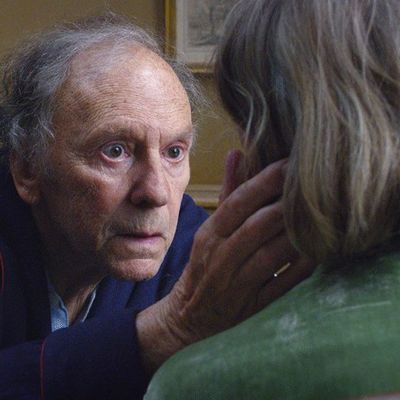
In Amour, the German provocateur (provoc-auteur?) Michael Haneke has discovered a real-world antagonist even more brutal than he is: time. Over two grueling hours, he charts the stages in the decline of an elderly woman and the impotence and grief of her husband.
They are not just any octogenarian couple. They are the embodiment of Western European haute-bourgeois refinement ÔÇö always a juicy target for the proto-punk Haneke. Anne (Emmanuelle Riva) and Georges (Jean-Louis Trintignant) are retired music teachers, proud, punctilious, and self-sufficient. Their spacious apartment is a bastion of culture, a refuge ÔÇö until it becomes a prison. After the first scene, in which the couple attends a concert by one of AnneÔÇÖs former pupils and returns to find the lock on the front door smashed, they are only seen inside their flat, the light growing colder as Anne loses one precious faculty after another. Whenever the film fades to black, you steel yourself for the next chapter, in which she will have descended yet one more rung on the evolutionary ladder. First there are small strokes, then large ones. Then comes paralysis, loss of movement, loss of language. What is left? Amour. Or its opposite. With Haneke, itÔÇÖs often hard to tell. ┬á
Is that title compassionate or mocking? Again, hard to tell. No director works as single-mindedly to punish his audience ÔÇö to make it pay double for every voyeuristic pleasure. You could argue in this case that his cruelty is a form of compassion. ItÔÇÖs one reading. In outline, Amour evokes David CronenbergÔÇÖs The Fly, which was influenced by the last months of the directorÔÇÖs fatherÔÇÖs death from a wasting disease. In CronenbergÔÇÖs scenario, the horror of the protagonistÔÇÖs degeneration is tempered by the love of his girlfriend: She is afraid, ÔÇ£very afraid,ÔÇØ but she doesnÔÇÖt turn away. When his agony reaches its zenith and she splatters whatÔÇÖs left of his human brain on the wall, the moment is positively operatic. Haneke is nowhere near as romantic: His static camera gazes on the coupleÔÇÖs anguish with clinical dispassion. ItÔÇÖs quite a feat to be bested in the humanistic warmth department by David Cronenberg.
Haneke would wear that loss as a badge of honor. ItÔÇÖs possible that heÔÇÖs acting out of some primal rage against parents whose primary allegiance is to each other and not their child ÔÇö here a daughter, also a musician, played by Isabelle Huppert. Is there a link between HuppertÔÇÖs character and the self- and other-mutilating musician she played in The Piano Teacher? How can there not be? In the same way that Anne and Georges are yet another Anne and Georges (or Ann and Georg or George) in a long besieged line of Haneke protagonists, so Huppert is once again a woman for whom the masterpieces of the Western canon do nothing to strengthen her ties to her amours. (Her British husband, also a musician, cheats on her.) The music offers little in the way of transcendence. ÔÇ£Incredible semiquavers in the presto,ÔÇØ Anne remarks early on of her ex-pupilÔÇÖs performance. ÔÇ£Such finesse!ÔÇØ It is finesse that she treasures most in life ÔÇö and itÔÇÖs finesse thatÔÇÖs the first thing to go.
It is odd, after all that, to detect in Amour an overarching tenderness. Haneke ÔÇö as is his anti-psychological, anti-Method wont ÔÇö depersonalizes Trintignant and Riva, but he doesnÔÇÖt sneer at them. They are not sitting on some specific dark secret against the underclass that makes their punishment poetically just. He allows Georges to have more agency than the poor parents in Funny Games, a movie so not-nice he made it twice. And he has cast two magnificent actors whose spirits cannot be violated, no matter how grotesque the context. Even delivering the line, ÔÇ£Such finesse,ÔÇØ Riva is radiant.
Something sacred passes between Trintignant and Riva. The actresss eyes signal deep awareness as the sounds coming out of her mouth become animalistic. Her final plaint is mal  mal  mal , the l of course silent, so it could be the bleat of a helpless sheep or the call of an infant for its mother. Trintignant has never been an especially psychological actor. As Pauline Kael wrote of him in The Conformist, he conveys the mechanisms of thought through tension, the way Bogart did. In Amour, it the persistence of his gaze that signals his characters despair. Georges shuts out everything in the world but Anne. He tells his daughter it annoys him to see her breeze in: You have your life, leave us ours. But he knows the battle is lost. There is a minor skirmish with Nature in the form of a pigeon that flies in the window, a sad caricature of a Hitchcock bird as well as Poes raven, which responds in the negative to the question, Is there balm in Gilead? Georgess spasmodic climactic gesture is either an act of amour or of rage. Or both.
Can a film be a great work of art with so little affect in the face of human agony? That is the problem posed by everything Haneke has done. But the wintry Amour seems to me to be the closest to pity he has come, if only because Nature beats him to the punch. It is a stunning film.


